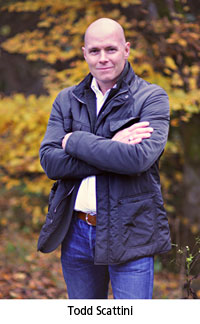Todd Scattini, Kansas City, Missouri
Todd Scattini’s journey to medical cannabis activism began, improbably, in Afghanistan. An Army officer, Scattini was asked in 2011 to devise a plan to create an industry for the Afghans out of the resources they had.

The three main resources they had were opium, rare minerals (which China had secured the rights to), and cannabis. He decided hemp would be perfect. The plant was not just well suited to the region’s environment and farming techniques but promised to dilute the prohibition market in drug cannabis through cross-pollination. His proposal fell on deaf ears, but his hemp research had exposed him to information about the potential of medical cannabis, and he was hearing from veterans that it could help with everything from PTSD to chronic pain. By the time he got to his final post, Ft. Leavenworth, Kansas, he was passionate about medical cannabis and determined to apply all he’d learned in an unusual military career.
After enlisting in 1990, Scattini had been sent to the military language school in Monterey, then to West Point. He emerged an officer in the tank corps, speaking Czech, Slovak, Russian and German, and became a cavalry troop commander for the 1st Infantry Division stationed in Germany. He would go on to become a European Foreign Area Officer and defense attaché serving in six different countries, including the Czech Republic, Belgium, Bosnia, Slovenia, France and Afghanistan, where his liaison duties meant understanding not just the local language but the history, culture and politics of the place.
He would finish his military service teaching strategy at the Command and General Staff College at Fort Leavenworth, just across the river from Kansas City, Missouri.
“One of the first things I did at Ft. Leavenworth was go to the JAG office to ask if the Army would have any problem with me joining Kansas City NORML,” Scattini says. “They said I just couldn’t appear in uniform or use it myself.” So Scattini went to work raising awareness, speaking at every opportunity and engaging with veterans in Kansas City, which is home to the headquarters of the Veterans of Foreign Wars (VFW).
“The medical properties of cannabis were important, but the more I learned, the social justice impacts became very important,” says Scattini. “At the roots of prohibition were serious racism and greed – things that seemed incredibly un-American – and I wanted to change that. It didn’t seem representative of the country I had signed up to defend.”
After 27 years of service, Scattini retired as a Lt. Colonel at midnight on December 31, 2017. “One second later, cannabis was legal in California,” says Scattini, who sees many parallels between his own life and what’s happened with cannabis in the U.S., from being born in 1970, the year Congress passed the Controlled Substances Act, to graduating West Point the year the first state medical law was passed.
A native Californian, Scattini decided to stay in Kansas City after he left the Army because he saw an opportunity to affect the situation in Missouri, which is home to more than 450,000 veterans. Eleven months later, the state’s voters approved Amendment 2, enacting a medical cannabis program Scattini calls the best in the nation.
Now he is pushing to make Kansas City a leading center for medical cannabis research in the U.S., meeting regularly with the mayor’s office about how blighted urban area can be revitalized by welcoming research, manufacturing, and dispensaries. He’s found allies in other West Point grads working in the Mayor’s office, and he’s lobbying the Veterans Administration and the VFW to support more research and access for veterans.
“Cannabis can be an alternative to the methods we have been using to treat the injuries of combat,” he says. “It can help alleviate not just suicides and overdoses but the problems veterans face with education, employment, homelessness and addiction.”
The day after Missouri passed its medical cannabis initiative, Scattini created Cavalry Cannabis, the first of two cannabis companies he has now founded.
“Reconnaissance is the cavalry’s mission, and as the nation expanded, it was cavalry scouts from Ft. Leavenworth who would escort settlers West,” he says. “We’re on a new frontier of medicine, and veterans should be part of leading the way.”
He’s now in the process of pursuing a license for a fully integrated facility for research and development that he hopes will attract support from the VA and Department of Defense. His Harvest 360 Tech project is using analytics to create 3D maps of cannabis for therapeutic applications. He has also been working on The Athena Protocol a strategy to mitigate and treat Traumatic Brain Injury (TBI), what he describes as his passion project.
“I had a platoon leader die from the effects of a head injury after five weeks,” he says. “Losing him was really painful for me. I’m convinced immediate treatment with cannabinoids might have saved him.”
Scattini is also convinced that Kansas City has the potential to be the leader for medical cannabis in the U.S.
“We’re in the geographic center of the country, we have so many veterans and services for them here, and we have the city government completely on board,” Scattini says. “We’re working with them to rebuild the infrastructure of the past to become a city of the future -- something they can be very proud of.
This profile was originally published in the February 2019 ASA Activist Newsletter
Share this page






















